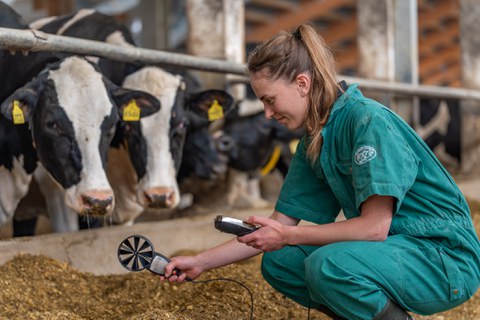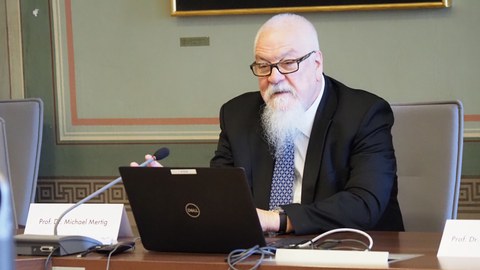Jul 14, 2025
Climate adaptation for the livestock barn of the future: New ‘Centre for Sustainable Animal Husbandry’ founded
On 11 July 2025, the association ‘Centre for Sustainable Animal Husbandry’ was founded at the TU Bergakademie Freiberg (TUBAF). Under the leadership of the Freiberg University, researchers, private individuals and members of the business community have joined forces to promote an innovation pool for the animal-friendly and sustainable livestock housing of the future. Initially, the alliance will start as a registered association. Prof. em. Michael Mertig from the TU Dresden is a member of the association's board.
This summer, heat waves are once again sweeping across Europe, and livestock are not spared. Temperatures in stables are rising to unbearable levels, as cows suffer from heat stress at temperatures above 15 degrees Celsius. In times of climate change, researchers and farmers are aware that stables will have to change in the future in order to provide better climatic conditions, especially for cattle. The stable of the future – this is where the Centre for Sustainable Animal Husbandry comes in.
Expertise in climate- and animal-friendly barn construction
A poor barn climate has an enormous impact, not only on the milk yield of cows: ‘We know from our research that most of the animal health problems and animal losses currently occurring in dairy farming, as well as the restrictions on the well-being of our cattle, are due to a suboptimal housing environment,’ says the association's chairman, Professor Alexander Starke.
With its expertise in fluid mechanics and ventilation, TUBAF is the engineering think tank within the network. Professor Rüdiger Schwarze explains: "We are measuring the air flows and the cows' breathing at a dairy farm near Leipzig, the Kitzen agricultural cooperative, and have used the data to create a digital twin of the barn. This provides initial indications of which measures could lead to a better barn climate in the future."
Freiberg Rector Professor Klaus-Dieter Barbknecht initiated the association together with Starke and Schwarze. "With the Freiberg Centre for Sustainable Animal Husbandry, we have put one of the most pressing climate factors on our agenda: agriculture. As a resource university that conducts research into sustainable solutions for the challenges of the present, such as climate change, we can effectively apply our expertise in engineering, geosciences and energy technology here," says Professor Klaus-Dieter Barbknecht.
Facilitating joint research
The Centre for Sustainable Animal Husbandry has already begun preparing joint research initiatives. A thematically linked research project at the TU Bergakademie Freiberg on the precise accounting of greenhouse gas emissions from dairy cattle stables was launched at the beginning of 2025. The project, led by Professor Schwarze, is funded by the Dr. Erich Krüger Foundation. "The project is a kind of initial spark to intensify research in networks. At the Centre for Sustainable Animal Husbandry, we bring together the knowledge of researchers from different disciplines and experienced practitioners from the fields of barn construction and agriculture. Our aim is to provide impetus for climate- and animal-friendly livestock housing construction at both national and international level."
Michael Mertig, Professor Emeritus of Physical Chemistry, Measurement and Sensor Technology at TU Dresden and the Kurt Schwabe Institute in Meinsberg, also sees great potential for cooperation: ‘The competence centre offers many points of contact for research projects at TU Dresden, particularly in the fields of mathematics and natural sciences, engineering sciences and the new Cluster of Excellence ’CARE: Climate-Neutral and Resource-Efficient Construction" in the climate-efficient, sustainable design of livestock housing and the associated supply systems (water, energy, air). Building on many years of experience in applied sensor research, the KSI Meinsberg aims at the creation of innovative technical solutions to improve animal health and welfare as one of its strategic tasks.
A video presenting the project for the precise accounting of greenhouse gas emissions from dairy cattle barns also shows what research on the barn of the future looks like: https://www.youtube.com/watch?v=HoL7GY4HjHk
The association's board consists of the following persons:
• Prof. Dr. Alexander Starke, Clinic for Hoofed Animals at the Faculty of Veterinary Medicine, University of Leipzig (Chair)
• Prof. Dr. Rüdiger Schwarze, Institute for Mechanics and Fluid Dynamics, TUBAF (Deputy Chair)
• Dr. Uwe Bergfeld (Treasurer)
• Prof. Dr. Michael Mertig (TU Dresden)
• Prof. Dr. Alexander Stahr (HTWK Leipzig)
The founding members also include:
• Prof. Dr. Klaus-Dieter Barbknecht (Rector of TUBAF)
• Dr. Steffen Pache
• Thomas Seidel (Managing Director of HERMES GmbH Stalleinrichtungen)
The TU Bergakademie Freiberg is a founding member as a legal entity.


